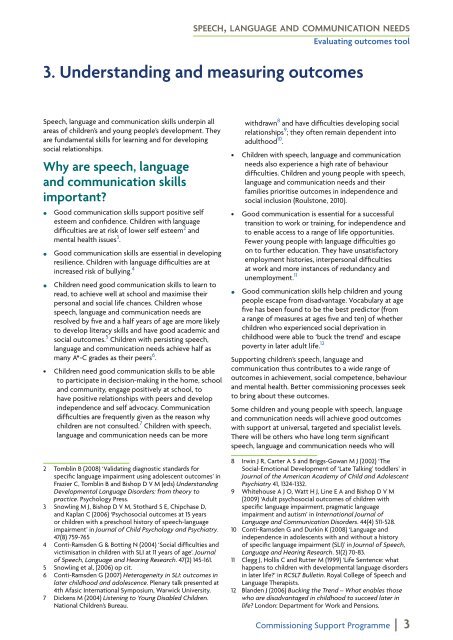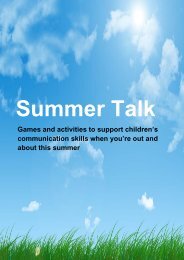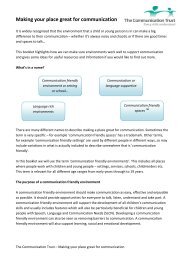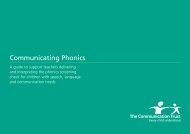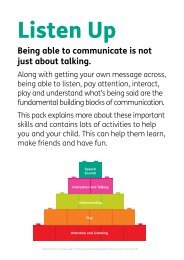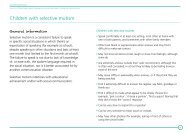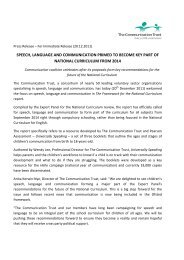Speech, language and communication needs: Evaluating outcomes ...
Speech, language and communication needs: Evaluating outcomes ...
Speech, language and communication needs: Evaluating outcomes ...
You also want an ePaper? Increase the reach of your titles
YUMPU automatically turns print PDFs into web optimized ePapers that Google loves.
speech, <strong>language</strong> <strong>and</strong> <strong>communication</strong> <strong>needs</strong><br />
<strong>Evaluating</strong> <strong>outcomes</strong> tool<br />
3. Underst<strong>and</strong>ing <strong>and</strong> measuring <strong>outcomes</strong><br />
<strong>Speech</strong>, <strong>language</strong> <strong>and</strong> <strong>communication</strong> skills underpin all<br />
areas of children’s <strong>and</strong> young people’s development. They<br />
are fundamental skills for learning <strong>and</strong> for developing<br />
social relationships.<br />
Why are speech, <strong>language</strong><br />
<strong>and</strong> <strong>communication</strong> skills<br />
important?<br />
• Good <strong>communication</strong> skills support positive self<br />
esteem <strong>and</strong> confidence. Children with <strong>language</strong><br />
difficulties are at risk of lower self esteem 2 <strong>and</strong><br />
mental health issues 3 .<br />
• Good <strong>communication</strong> skills are essential in developing<br />
resilience. Children with <strong>language</strong> difficulties are at<br />
increased risk of bullying. 4<br />
• Children need good <strong>communication</strong> skills to learn to<br />
read, to achieve well at school <strong>and</strong> maximise their<br />
personal <strong>and</strong> social life chances. Children whose<br />
speech, <strong>language</strong> <strong>and</strong> <strong>communication</strong> <strong>needs</strong> are<br />
resolved by five <strong>and</strong> a half years of age are more likely<br />
to develop literacy skills <strong>and</strong> have good academic <strong>and</strong><br />
social <strong>outcomes</strong>. 5 Children with persisting speech,<br />
<strong>language</strong> <strong>and</strong> <strong>communication</strong> <strong>needs</strong> achieve half as<br />
many A*-C grades as their peers 6 .<br />
• Children need good <strong>communication</strong> skills to be able<br />
to participate in decision-making in the home, school<br />
<strong>and</strong> community, engage positively at school, to<br />
have positive relationships with peers <strong>and</strong> develop<br />
independence <strong>and</strong> self advocacy. Communication<br />
difficulties are frequently given as the reason why<br />
children are not consulted. 7 Children with speech,<br />
<strong>language</strong> <strong>and</strong> <strong>communication</strong> <strong>needs</strong> can be more<br />
2 Tomblin B (2008) ‘Validating diagnostic st<strong>and</strong>ards for<br />
specific <strong>language</strong> impairment using adolescent <strong>outcomes</strong>’ in<br />
Frazier C, Tomblin B <strong>and</strong> Bishop D V M (eds) Underst<strong>and</strong>ing<br />
Developmental Language Disorders: from theory to<br />
practice. Psychology Press.<br />
3 Snowling M J, Bishop D V M, Stothard S E, Chipchase D,<br />
<strong>and</strong> Kaplan C (2006) ‘Psychosocial <strong>outcomes</strong> at 15 years<br />
or children with a preschool history of speech-<strong>language</strong><br />
impairment’ in Journal of Child Psychology <strong>and</strong> Psychiatry.<br />
47(8) 759-765<br />
4 Conti-Ramsden G & Botting N (2004) ‘Social difficulties <strong>and</strong><br />
victimisation in children with SLI at 11 years of age’. Journal<br />
of <strong>Speech</strong>, Language <strong>and</strong> Hearing Research. 47(2) 145-161.<br />
5 Snowling et al, (2006) op cit.<br />
6 Conti-Ramsden G (2007) Heterogeneity in SLI: <strong>outcomes</strong> in<br />
later childhood <strong>and</strong> adolescence. Plenary talk presented at<br />
4th Afasic International Symposium, Warwick University.<br />
7 Dickens M (2004) Listening to Young Disabled Children.<br />
National Children’s Bureau.<br />
withdrawn 8 <strong>and</strong> have difficulties developing social<br />
relationships 9 ; they often remain dependent into<br />
adulthood 10 .<br />
• Children with speech, <strong>language</strong> <strong>and</strong> <strong>communication</strong><br />
<strong>needs</strong> also experience a high rate of behaviour<br />
difficulties. Children <strong>and</strong> young people with speech,<br />
<strong>language</strong> <strong>and</strong> <strong>communication</strong> <strong>needs</strong> <strong>and</strong> their<br />
families prioritise <strong>outcomes</strong> in independence <strong>and</strong><br />
social inclusion (Roulstone, 2010).<br />
• Good <strong>communication</strong> is essential for a successful<br />
transition to work or training, for independence <strong>and</strong><br />
to enable access to a range of life opportunities.<br />
Fewer young people with <strong>language</strong> difficulties go<br />
on to further education. They have unsatisfactory<br />
employment histories, interpersonal difficulties<br />
at work <strong>and</strong> more instances of redundancy <strong>and</strong><br />
unemployment. 11<br />
• Good <strong>communication</strong> skills help children <strong>and</strong> young<br />
people escape from disadvantage. Vocabulary at age<br />
five has been found to be the best predictor (from<br />
a range of measures at ages five <strong>and</strong> ten) of whether<br />
children who experienced social deprivation in<br />
childhood were able to ‘buck the trend’ <strong>and</strong> escape<br />
poverty in later adult life. 12<br />
Supporting children’s speech, <strong>language</strong> <strong>and</strong><br />
<strong>communication</strong> thus contributes to a wide range of<br />
<strong>outcomes</strong> in achievement, social competence, behaviour<br />
<strong>and</strong> mental health. Better commissioning processes seek<br />
to bring about these <strong>outcomes</strong>.<br />
Some children <strong>and</strong> young people with speech, <strong>language</strong><br />
<strong>and</strong> <strong>communication</strong> <strong>needs</strong> will achieve good <strong>outcomes</strong><br />
with support at universal, targeted <strong>and</strong> specialist levels.<br />
There will be others who have long term significant<br />
speech, <strong>language</strong> <strong>and</strong> <strong>communication</strong> <strong>needs</strong> who will<br />
8 Irwin J R, Carter A S <strong>and</strong> Briggs-Gowan M J (2002) ‘The<br />
Social-Emotional Development of ‘Late Talking’ toddlers’ in<br />
Journal of the American Academy of Child <strong>and</strong> Adolescent<br />
Psychiatry 41, 1324-1332.<br />
9 Whitehouse A J O, Watt H J, Line E A <strong>and</strong> Bishop D V M<br />
(2009) ‘Adult psychosocial <strong>outcomes</strong> of children with<br />
specific <strong>language</strong> impairment, pragmatic <strong>language</strong><br />
impairment <strong>and</strong> autism’ in International Journal of<br />
Language <strong>and</strong> Communication Disorders. 44(4) 511-528.<br />
10 Conti-Ramsden G <strong>and</strong> Durkin K (2008) ‘Language <strong>and</strong><br />
independence in adolescents with <strong>and</strong> without a history<br />
of specific <strong>language</strong> impairment (SLI)’ in Journal of <strong>Speech</strong>,<br />
Language <strong>and</strong> Hearing Research. 51(2) 70-83.<br />
11 Clegg J, Hollis C <strong>and</strong> Rutter M (1999) ‘Life Sentence: what<br />
happens to children with developmental <strong>language</strong> disorders<br />
in later life?’ in RCSLT Bulletin. Royal College of <strong>Speech</strong> <strong>and</strong><br />
Language Therapists.<br />
12 Bl<strong>and</strong>en J (2006) Bucking the Trend – What enables those<br />
who are disadvantaged in childhood to succeed later in<br />
life? London: Department for Work <strong>and</strong> Pensions.<br />
Commissioning Support Programme | 3


